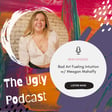
Perfectionism as a Superpower w/ Erika Steeves
In this episode, I’m rejoined by my fellow editor and twin perfectionist, Erika Steeves! We’re back to talk about perfectionism but through the lens of Katherine Morgan Schafler’s book, The Perfectionist’s Guide to Losing Control, the book that asks the question: What if your perfectionism is actually a superpower?
We were both deeply impacted by this book as it aligns so well with the path we’d already begun with our perfectionism and then adding another layer of shame-shedding by transforming what had been perceived as a weakness into a superpower. How cool is that? Be sure to check out our first episode on perfectionism, Tolerating Imperfection. And follow Erika on Instagram @erika.steeves.edits.
This episode launches me into a hiatus with the podcast so I can rest and focus on my own healing for the time being. The Ugly Podcast will return in either the fall or the winter depending on how said healing goes. 🤷🏻 In the meantime, you can follow me on Instagram @scribeandsunshine. Keep making ugly things and lean into that perfectionism in new ways. I can’t wait to see what we all do next!
References:
The Perfectionist’s Guide to Losing Control: A Path to Peace and Power by Katherine Morgan Schafler
Get Your Perfectionist Profile

















